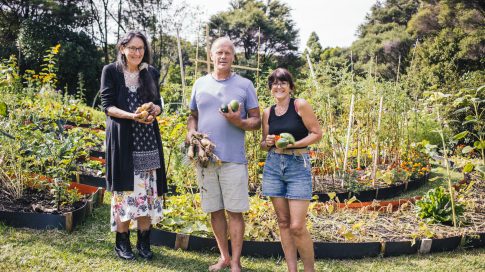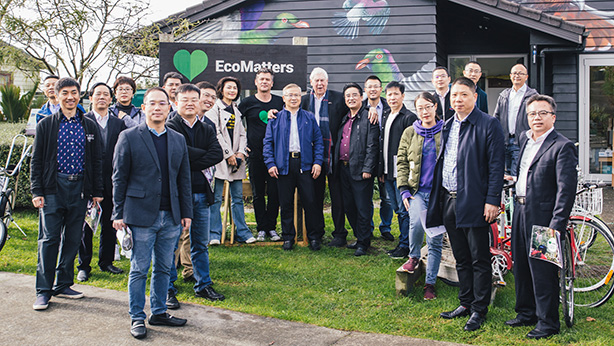
A tale of two…
Posted:
EcoMatters CEO Damon Birchfield is recently returned from an environmental and cultural exchange to China and tells us more about his visit:
This was my first time in China and I think the overwhelming theme of my trip could be summed up as a ‘tale of two’.
My trip was in two distinct parts, which showed me two very different sides to China and made me realise there are two very different approaches to change and development; top down and grass roots.
The big city
First, I had a few days in Guangzhou, one of China’s three largest cities, and a major port and transportation hub.
There I attended a conference launching the Bay Cities Innovation Initiative, which brings together representatives from bay cities as diverse as New York, Japan, San Francisco and Dubai, to find ways to develop clean and sustainable industries.

At the Young Game Changers event
The region
The second part of my trip was a visit to Quzhou, which is about 400km from Shanghai. In the Chinese administrative structure, it’s known as a prefecture-level city, and includes a major urban town centre and surrounding rural area with smaller towns, cities and villages.
The connection with Quzhou began in June when we were honoured to host a delegation from the area, including the Party Secretary for Quzhou, who came to New Zealand to learn more about social and ecological aspects of development.
Sustainable Urban Communities
There’s no doubt that China is the poster child for rapid urban development and it’s often assumed that this is at the cost of the natural environment.
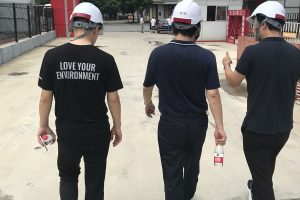
But Quzhou is one of several Chinese regions participating in the Sustainable Urban Development and Liveable Garden Community (SUC for short) programme, run in partnership with the United Nations Environment Programme (UNEP).
Their goal is to embed more sustainable principles into development happening in developing countries and China is leading the way, creating pilots for other countries to learn from.
The scale of development happening just in the two places I visited is mind-boggling to us New Zealanders. I could scarcely believe the vast numbers of cranes I saw – at one place I visited, a huge number of high rise towers were going up at the same time!
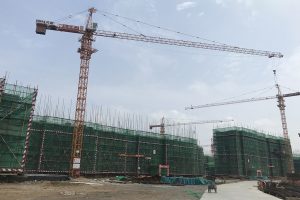
The challenges
One of the challenges facing Chinese cities the size of Quzhou, where the economy is based around agricultural production, is how to attract and retain residents who may prefer the allure of the ‘big city’.
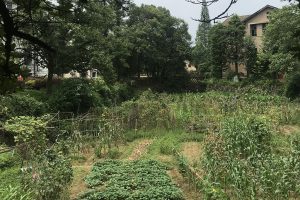
A typical village garden plot
It’s a story familiar to us here in New Zealand too – we often talk about similar challenges faced by our ‘regions’.
To combat this, Quzhou wants to make people feel proud to live there, and proud of their engagement and connection with the land, and ensure the environment is cared for.
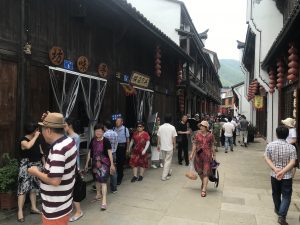
A village in Quzhou
There are of course two approaches to making this happen. China’s political system means they can comprehensively plan for the long term, so a ‘top down’ approach has been the more common way to undertake development.
More engagement
But during my time there I saw a real desire from officials to engage with their communities better, upskill them, and take a more sustainable approach to development and urban regeneration. They recognise there is a real need to build, not just housing, but also communities, in the true social sense of the word, this way.
And it’s this ‘grass roots’ community engagement approach that I believe we do so well here at EcoMatters, and for that matter right across New Zealand.
This knowledge and understanding of the community engagement approach has value in our global economy and I’m really looking forward to building our connection with Quzhou and the work being done there. I think there is much we can continue to learn from each other.
It was a truly eye-opening visit and I would like to thank my hosts from the Sustainable Urban Development and Liveable Garden Community (SUC) organisation for their hospitality.

